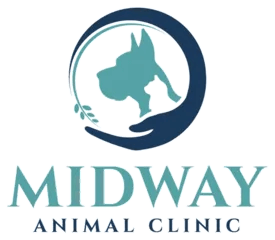Medications: All medications will be discussed at time of discharge and labeled with instructions. Unless noted otherwise, all meds are to be given with food.
Diet: Feed small amounts of food (~½ their normal meal) and water tonight. Your pet may not eat for the first 12–24 hours. Excessive amounts of water or food may cause vomiting. Notify the clinic if your pet refuses to eat or drink for more than 24 hours.
Confinement: No running, jumping, climbing, or playing; leash walks only for 7 days. Unsupervised activity can lead to complications requiring further care or additional surgery.
Bathing/Swimming: None for 10 days.
Bandage Removal: If your pet has a bandage on their front leg, please remove it when you get home. Dried blood underneath the bandage site is normal. If the site bleeds, apply light direct pressure for 5 minutes. Contact us or the emergency veterinary clinic if the bleeding does not resolve. Leaving this bandage on for prolonged periods can result in complications.
Incision: Please check your pet’s incision daily; keep the area clean and dry. A very mild amount of swelling and/or bruising can be normal. If you notice any redness, excessive swelling, or discharge, contact the clinic. Keep your pet from licking or chewing the incision. A T-shirt or an E-collar (lampshade collar) is needed at all times during this period. Even a small amount of licking/chewing can cause the surgical site to open (“dehiscence”).
Sutures: If your pet has external sutures (“stitches”), they should be removed in approximately 14 days unless directed otherwise. Please make an appointment to have your pet’s sutures removed. If there are no external sutures, dissolvable sutures were placed below the skin. No follow-up appointment is needed unless directed otherwise.
Bowel Movements: It is normal for a pet to experience constipation as a side effect of anesthesia. If you note any straining to defecate, vomiting, or diarrhea, please contact the clinic immediately. Do not be alarmed if your pet doesn’t defecate for several days after anesthesia.
Please contact the 24-hour emergency veterinary clinic, Carolina Vet Specialist, at 336-896-0902 if your pet is experiencing any of the following symptoms outside of our normal business hours:
- Significant lethargy
- Pale gums and/or difficult/rapid breathing
- Bleeding (some very mild vaginal bleeding can be normal for dogs spayed during heat or after bladder surgery)
For non-urgent questions, or to send pictures of the incision if you have concerns: Text us at 336-764-5000.
